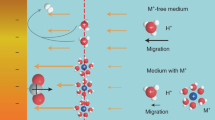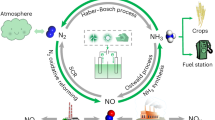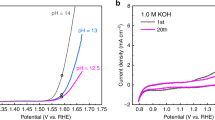Abstract
IT was shown recently in this laboratory1 that the emission of positive ions from a heated Kunsman catalyst is accompanied by the evaporation of neutral atoms. In particular, a cæsium source heated in the neighbourhood of a sodium source deposited cæsium on the latter, so that when it was heated in turn, it emitted cæsium and not sodium ions. The number of cæsium ions emitted from the sodium source was large in this sense that it corresponded to the deposition on the superficial area of the source of a layer of cæsium a thousand atoms thick.
This is a preview of subscription content, access via your institution
Access options
Subscribe to this journal
Receive 51 print issues and online access
$199.00 per year
only $3.90 per issue
Buy this article
- Purchase on Springer Link
- Instant access to full article PDF
Prices may be subject to local taxes which are calculated during checkout
Similar content being viewed by others
References
Tyndall and Powell, Proc. Roy. Soc., A, 136, 145; 1932.
Lennard-Jones, Trans. Faraday Soc., 28, 333; 1932.
Powell and Brata, Proc. Roy. Soc., A, 138, 117; 1932.
Author information
Authors and Affiliations
Rights and permissions
About this article
Cite this article
POWELL, C., BRATA, L. Positive Ion Emission from Oxide Catalysts. Nature 131, 168–169 (1933). https://doi.org/10.1038/131168a0
Issue Date:
DOI: https://doi.org/10.1038/131168a0
Comments
By submitting a comment you agree to abide by our Terms and Community Guidelines. If you find something abusive or that does not comply with our terms or guidelines please flag it as inappropriate.



